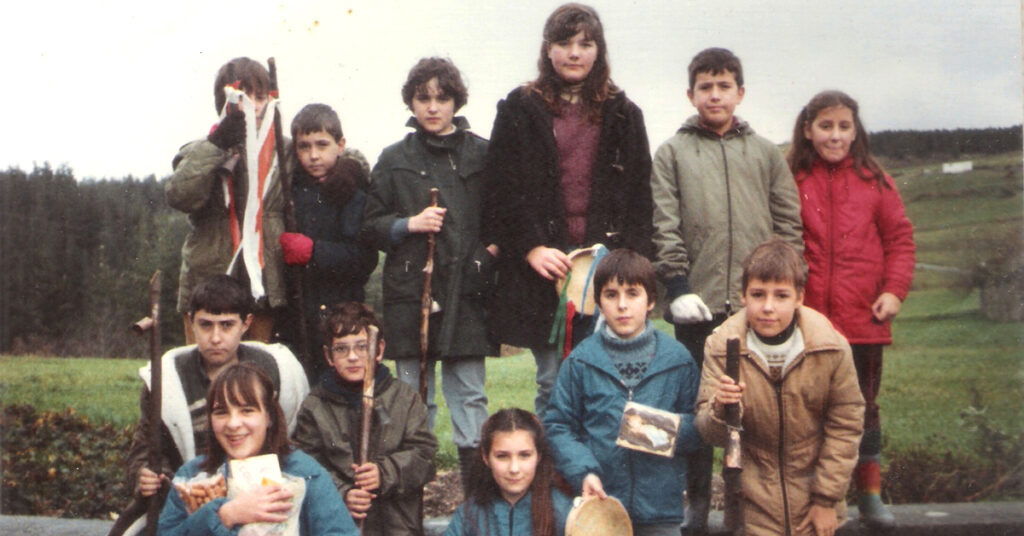Basque ethnography at a glance

Singing christmas carols in Akorda (Ibarrangelu, 1982). Source: Labayru Fundazioa Photographic Archive.
During the year and, particularly, in winter and its harsh climate, groups of the needy begged from house to house in the villages, asking the dwellers for alms or handouts in kind or food (eggs, chorizo sausage, bacon, black pudding, walnuts, hazelnuts, pears, apples, oranges, etc.). That intrinsic act of Christian charity or the traditional hospitality of the people of the rural world was usually met with the beggars politely and gratefully expressing wishes of health and prosperity in return.
It may have been based on the “from the haves to the have-nots” (duenak eztuenari eman! o dekonak eztekonari nik eztekot eta niri!) principle and the very social fact of begging for alms was its practical application, and some wassailing celebrations were based on the customs of the needy or victims of some misfortune. Over the centuries, and particularly in prosperous times, that begging for alms became widespread or resulted in more interested and locally based requests, led by young people or flocks of children, imitating their reference groups.
Thus, in the run up to Christmas, children mark the monastic feast day of St. Nicholas (6 December) by singing for alms, with the blessing of one of them dressed as a bishop (Segura, Zegama or Legazpi). Wassailing on nine days (bederatzi urren) or Christmas Day is widespread to celebrate the birth of Baby Jesus (Marijesiak or Abendua) or his kindly emissary, the “Olentzero” (the mythical figure of a charcoal burner that brings the presents to Basque children).
Coinciding with the end of the “Julian” or solar calendar, a series of rites have been kept to see out the old year (Urte zahar) and welcome the new one. There are the rites of passage associated with water and wishes for prosperity, common to different valleys of the north of Navarra and the neighbouring Labourd and Gipuzkoa. There is no lack of groups of children throughout the country that go wassailing for a festive gift from the locals and wishing them an angelic blessing (Urte barri, Dios te Salve, Glin glan, Ur goiena, Urtatsak, Phika, haur, etc.).
In tandem, the eve and festivity of the Epiphany or the Three Kings are marked by the choice of the king (the person who has the broad bean or trick in the typical cake, child or youth leaders, etc.), the roars of young ones in a round with cowbells (gare jotzeak or making a racket with shears and/or small bells in Sakana, Malerreka, Baztán, Roncal and Merindad de Estella), the unusual close presence of the main characters of the day, and, of course, the wassailing around the neighbourhood or with relatives (Erregeak edo Apalazioa, Epiphany bonus, Epiphany Marzas dances, etc.).
At the Christmas festivities of New Year and Epiphany, the children’s ditties and songs are about the reason for the celebration, the members of the procession, what they are asking for and their thanks in rhyme, if the gift is given, or the acrimonious response, if not. That can be all seen in the excitement of the commotion as the children keep up and pass on the traditions of their elders and, in turn, the latter are delighted to see their offspring in a role that they had enjoyed; logically, the harmless visit, the good wishes given to the households and communities, and the fulfilment of the rite of returning to the perennial returning to those celebrations must be rewarded.
Josu Larrinaga Zugadi – Sociologist


